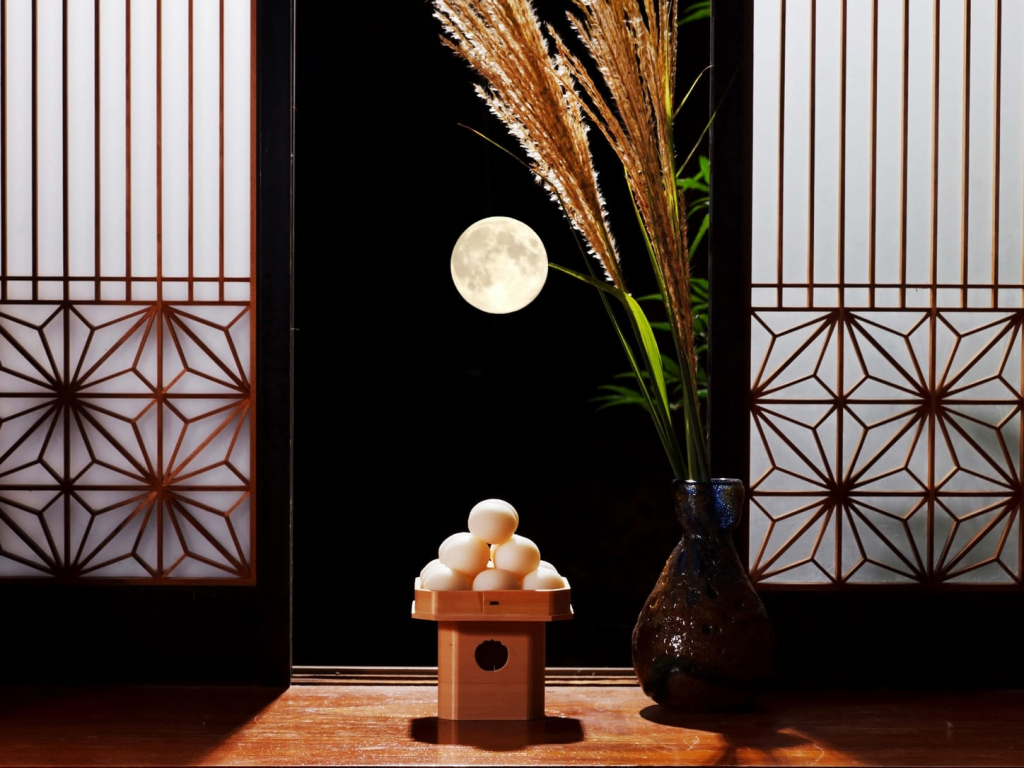The people of Japan have an intriguing affinity with the natural world. Perhaps an acute awareness of Mother Nature’s potential for savage violence encourages an appreciation of her more forgiving moods. Whatever the reason, this is a country where the everyday wonders of the fields, forests and mountains, and of the changing seasons are often a cause for celebration. Think of the springtime hanami parties to welcome the cherry blossom and later in the year, as the temperatures fall and the leaves begin to turn, all those weekend pilgrimages to marvel at the reds and golds of autumn.
The Japanese fascination with sakura and koyo is well known but at this time of year another long-established custom comes to the fore. Tsukimi or “moon-gazing” may be associated with occasional special lunar events but in this country we don’t have to wait for an eclipse to turn our attention to our extra-terrestrial neighbour. A full moon in any month is worthy of our appreciation and at this time of the year the Harvest Moon is always a special cause for celebration. Children all over Japan will enjoy eating sweet tsukimi dango (white rice dumplings) and singing their jugoya songs to the rabbit in the moon. That’s right, the rabbit in the moon.
Once upon a long time ago, so the story goes, the old man of the moon crossed the sky to explore the big blue world below. The journey was long and tiring – he was a very old man after all – and when he finally arrived he was famished and desperately in need of sustenance. Luckily for him, he had made landfall in Japan where they happen to know a thing or two about hospitality and good food, so help was not long in coming. First on the scene was a monkey, curious to find out where this strange old beggar had sprung from, closely followed by an equally inquisitive fox and a rather nervous rabbit (most rabbits are nervous when there’s a fox about).
“Please help me,” begged the old man. “I’m starving. Is there any food to be found round here?” To be honest he was putting it on a bit but, as any guest in this country learns very quickly, there is no more distressing sight to a Japanese host than a hungry visitor. The monkey immediately dashed off through the trees and soon returned with an armful of looted fruit and the wily fox was just as quick to snaffle a fine fish from a nearby stream.
The rabbit however, though just as eager to please, could only hop round and round in a state of bewildered panic: “What can I give him? He can’t eat grass, the owl café isn’t open yet and the nearest vegetable patch is miles away…” Eventually, he came up with a not-so-bright and rather macabre, idea: “Dear old fellow,” he said. “A persimmon or two and a few slices of fresh sashimi are all very well but you need something more substantial to warm you up. If you could light a fire, I would be honoured to provide you with a tasty roasted rabbit.”
Now if this had been just any hungry traveller the story might have had a very different ending but it all worked out well in the end. Surprised and strangely moved by the suicidal generosity of his new-found furry friend, instead of reaching for a box of matches and his chopsticks, the grateful old man gathered him up in his arms and flew back home to the moon where, as every Japanese child knows, they both lived happily ever after – as enthusiastic vegetarians.
It seems to me that a folk-tale about generosity and selflessness and kindness to strangers is one worth thinking about in these uncertain times. Too often our daily news is dominated by stories of blind nationalism, narrow self-interest and a blatant disregard for the needs of our neighbours or of the generations to come. It may be no more than a child’s fairy-story but perhaps we should all look up at the moon tonight and remember the rabbit…
Usagi usagi
Nani mite haneru
Juugoya o-tsuki-sama
Mite haneru
(Oh, rabbit on the moon,
What are you leaping for?
I shall leap, I shall leap soon
At the large full moon!)
Words by Brian Christian, the Principal of the British School in Tokyo









